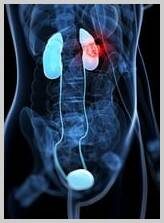
Kidney Cancer
Kidney or renal cancer is characterized by a tumor or mass that begins in the kidney. Kidneys are the bean-shaped organs that help filter and remove excess water and waste from the body through the production of urine. Cancer that originates in the kidneys is relatively common, with more than 60,000 people in the United States diagnosed with it every year.
Types of Kidney Cancer
There are several different types of kidney cancer, classified by where it originated from.
● Renal-cell carcinoma, the most common form of kidney cancer begins in the small tubes found in the kidney. It typically begins as a single mass and it can usually be identified before it spreads to other areas of the body.
● Transitional-cell carcinoma originates from the renal pelvis and ureter.
● Wilms tumor is a rare kidney cancer that is generally found in young children
● Renal sarcoma is a rare cancer that begins in the blood vessels or connective tissue of kidney
*It is important to note there are several different kinds of growths in the kidneys that are benign, which means they do not cause disease or issues.
Causes of Kidney Cancer
The exact cause of kidney cancer is unknown. There are several risk factors for developing cancer. Kidney cancer is thought to be the result of a specific gene mutation that can be inherited or acquired. Factors linked to a higher risk of developing kidney cancer include the following:
● Smoking either now or in the past. Also second hand smoke exposure
● Obesity
● Regular exposure to certain substances or chemicals
● Family history of kidney cancer
● High blood pressure
● Certain medications
● Advanced kidney disease
Symptoms of Kidney Cancer
Kidney cancer often does not cause symptoms until it has progressed to its later stages, instead it is often found incidentally (when having imaging for another reason). In advanced cancer the following symptoms may be present:
● Blood in the urine either visible (gross) or microscopic (not visible to the eye)
● Back pain
● Weight loss
● Fatigue or feeling unwell
● Swelling in the legs or ankles
● Palpable lump in the abdomen or on the side
Diagnosis of Kidney Cancer
If kidney cancer is suspected, a thorough physical examination is performed. Some of the following tests may also be administered to confirm a diagnosis:
● Ultrasound of the kidneys
● CT scan or CT urogram
● MRI scan
● Blood testing
● Kidney biopsy
● Ureteroscopy (camera to ureter and kidney to look at and possible biopsy tissue)
Stages of Kidney Cancer (AJCC guidelines)
Stage I
In Stage I kidney cancer, the tumor is confined to the kidney. There is no evidence of spread to lymph nodes or other organs.
Stage II
With Stage II renal cancer, the tumor is confined to the kidney but is large in size. Cancer has not spread to any lymph nodes or other organs.
Stage III
With Stage III kidney cancer, the cancer has spread from the kidney into the lymph nodes next to the kidney, and may have spread into the blood vessels leading from the kidney to the heart.
Stage IV
In Stage IV kidney cancer, the cancer has spread from the kidney to adjacent organs, and possibly to the lungs, liver, colon, bowels or abdominal wall among others.
Treatment of Kidney Cancer
There are several different types of treatments available for kidney cancer. The best treatment for each patient depends on the severity and location of the disease taking into account patient preference and other medical conditions. Surgery is often the most effective treatment as it removes the cancer from the kidney. Surgery may involve removing just the tumor (partial nephrectomy) , or the entire kidney may be removed (total nephrectomy).
For some patients, surgery may not be a good option. Less invasive treatments are available to treat the disease for these patients, and may include the following:
● Cryoablation
● Radiofrequency ablation
● Biological therapies
Regardless of the treatment option, the patient will need frequent follow-up and monitoring for recurrence of di
